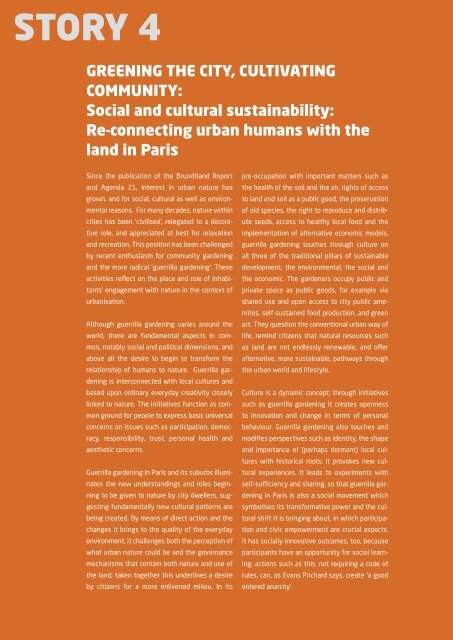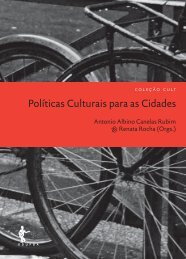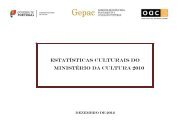Culture in for and as Sustainable Development
YIGflg
YIGflg
You also want an ePaper? Increase the reach of your titles
YUMPU automatically turns print PDFs into web optimized ePapers that Google loves.
STORY 4<br />
GREENING THE CITY, CULTIVATING<br />
COMMUNITY:<br />
Social <strong>and</strong> cultural susta<strong>in</strong>ability:<br />
Re-connect<strong>in</strong>g urban humans with the<br />
l<strong>and</strong> <strong>in</strong> Paris<br />
56<br />
S<strong>in</strong>ce the publication of the Brundtl<strong>and</strong> Report<br />
<strong>and</strong> Agenda 21, <strong>in</strong>terest <strong>in</strong> urban nature h<strong>as</strong><br />
grown, <strong>and</strong> <strong>for</strong> social, cultural <strong>as</strong> well <strong>as</strong> environmental<br />
re<strong>as</strong>ons. For many decades, nature with<strong>in</strong><br />
cities h<strong>as</strong> been ‘civilised’, relegated to a decorative<br />
role, <strong>and</strong> appreciated at best <strong>for</strong> relaxation<br />
<strong>and</strong> recreation. This position h<strong>as</strong> been challenged<br />
by recent enthusi<strong>as</strong>m <strong>for</strong> community garden<strong>in</strong>g<br />
<strong>and</strong> the more radical ‘guerrilla garden<strong>in</strong>g’. These<br />
activities reflect on the place <strong>and</strong> role of <strong>in</strong>habitants’<br />
engagement with nature <strong>in</strong> the context of<br />
urbanisation.<br />
Although guerrilla garden<strong>in</strong>g varies around the<br />
world, there are fundamental <strong>as</strong>pects <strong>in</strong> common,<br />
notably social <strong>and</strong> political dimensions, <strong>and</strong><br />
above all the desire to beg<strong>in</strong> to trans<strong>for</strong>m the<br />
relationship of humans to nature. Guerrilla garden<strong>in</strong>g<br />
is <strong>in</strong>terconnected with local cultures <strong>and</strong><br />
b<strong>as</strong>ed upon ord<strong>in</strong>ary everyday creativity closely<br />
l<strong>in</strong>ked to nature. The <strong>in</strong>itiatives function <strong>as</strong> common<br />
ground <strong>for</strong> people to express b<strong>as</strong>ic universal<br />
concerns on issues such <strong>as</strong> participation, democracy,<br />
responsibility, trust, personal health <strong>and</strong><br />
aesthetic concerns.<br />
Guerrilla garden<strong>in</strong>g <strong>in</strong> Paris <strong>and</strong> its suburbs illum<strong>in</strong>ates<br />
the new underst<strong>and</strong><strong>in</strong>gs <strong>and</strong> roles beg<strong>in</strong>n<strong>in</strong>g<br />
to be given to nature by city dwellers, suggest<strong>in</strong>g<br />
fundamentally new cultural patterns are<br />
be<strong>in</strong>g created. By means of direct action <strong>and</strong> the<br />
changes it br<strong>in</strong>gs to the quality of the everyday<br />
environment, it challenges both the perception of<br />
what urban nature could be <strong>and</strong> the governance<br />
mechanisms that conta<strong>in</strong> both nature <strong>and</strong> use of<br />
the l<strong>and</strong>; taken together this underl<strong>in</strong>es a desire<br />
by citizens <strong>for</strong> a more enlivened milieu. In its<br />
pre-occupation with important matters such <strong>as</strong><br />
the health of the soil <strong>and</strong> the air, rights of access<br />
to l<strong>and</strong> <strong>and</strong> soil <strong>as</strong> a public good, the preservation<br />
of old species, the right to reproduce <strong>and</strong> distribute<br />
seeds, access to healthy local food <strong>and</strong> the<br />
implementation of alternative economic models,<br />
guerrilla garden<strong>in</strong>g touches through culture on<br />
all three of the traditional pillars of susta<strong>in</strong>able<br />
development, the environmental, the social <strong>and</strong><br />
the economic. The gardeners occupy public <strong>and</strong><br />
private space <strong>as</strong> public goods, <strong>for</strong> example via<br />
shared use <strong>and</strong> open access to city public amenities,<br />
self-susta<strong>in</strong>ed food production, <strong>and</strong> green<br />
art. They question the conventional urban way of<br />
life, rem<strong>in</strong>d citizens that natural resources such<br />
<strong>as</strong> l<strong>and</strong> are not endlessly renewable, <strong>and</strong> offer<br />
alternative, more susta<strong>in</strong>able, pathways through<br />
the urban world <strong>and</strong> lifestyle.<br />
<strong>Culture</strong> is a dynamic concept; through <strong>in</strong>itiatives<br />
such <strong>as</strong> guerrilla garden<strong>in</strong>g it creates openness<br />
to <strong>in</strong>novation <strong>and</strong> change <strong>in</strong> terms of personal<br />
behaviour. Guerrilla garden<strong>in</strong>g also touches <strong>and</strong><br />
modifies perspectives such <strong>as</strong> identity, the shape<br />
<strong>and</strong> importance of (perhaps dormant) local cultures<br />
with historical roots; it provokes new cultural<br />
experiences. It leads to experiments with<br />
self-sufficiency <strong>and</strong> shar<strong>in</strong>g, so that guerrilla garden<strong>in</strong>g<br />
<strong>in</strong> Paris is also a social movement which<br />
symbolises its trans<strong>for</strong>mative power <strong>and</strong> the cultural<br />
shift it is br<strong>in</strong>g<strong>in</strong>g about, <strong>in</strong> which participation<br />
<strong>and</strong> civic empowerment are crucial <strong>as</strong>pects.<br />
It h<strong>as</strong> socially <strong>in</strong>novative outcomes, too, because<br />
participants have an opportunity <strong>for</strong> social learn<strong>in</strong>g;<br />
actions such <strong>as</strong> this, not requir<strong>in</strong>g a code of<br />
rules, can, <strong>as</strong> Evans Prichard says, create ‘a good<br />
ordered anarchy’.




